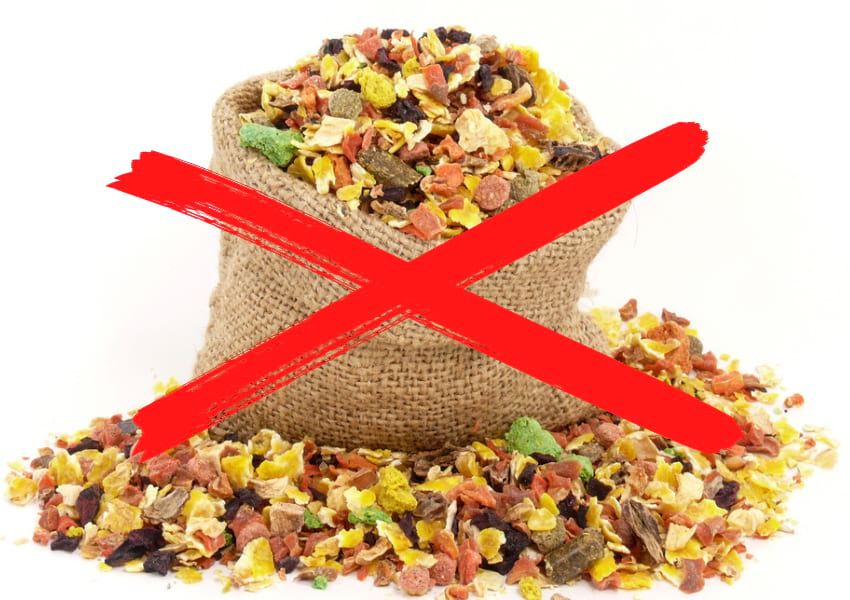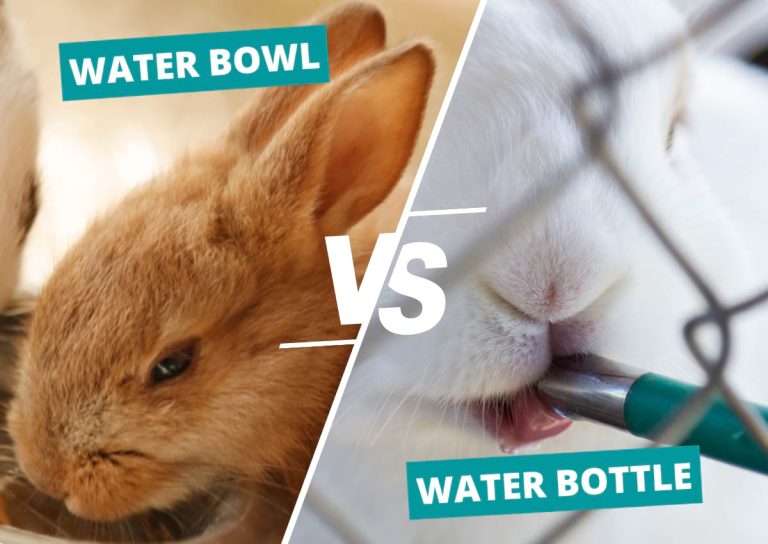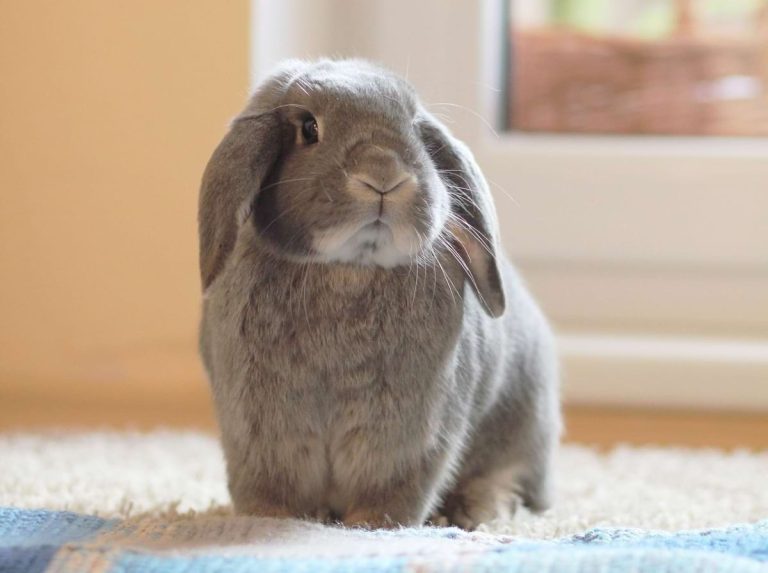Best Healthy Rabbit Treats & Snacks (& What to Avoid)

Rabbits are known for their insatiable appetites. They make vegetables and hay disappear in a blink of an eye, leaving behind fluffy bellies ready to take in more food.
But just because rabbits have a hearty appetite, it doesn’t mean that we can feed them whatever is at hand. As responsible pet parents, it is crucial to recognize the importance of a healthy diet for our furry companions, not only during mealtime but also at snack and treat time.
Rabbits have a sensitive digestive system. As such, if you want to give an extra niblet to your pet, then it’s imperative to understand what you can – and cannot – offer them as a treat.
Let’s look into the best healthy treats and snacks for rabbits!
Limiting How Many Treats They Eat – Even if It’s Healthy
Before we get into the specifics of what rabbit treats are acceptable and which ones you should steer clear of, it’s essential to highlight the importance of limiting their treat intake. Overfeeding them not only cuts into their meal rations but it also puts in place an unhealthy eating regimen.
Additionally, there are several foods that cannot be digested by rabbits, so be careful with your choice of rabbit treats. Always give these yummy tidbits in moderation. In no way should snacks such as fruits make up the bulk of your bunny’s diet.
Can You Give Your Rabbit Pet Store Treats?
Pet stores sell a vast assortment of colorful, savory morsels, each described as the perfect treat for your rabbit. However, none of these options offer an advantage over a diet of fresh hay, healthy pellets, and nutritious leafy greens and veggies.
So, what’s the big deal about feeding your bunny commercially manufactured treats?
Well, there are several reasons, in fact. First and foremost, however, they simply lack the necessary nutrition required – some brands even omit nutritional ingredients altogether! But mostly, these foods provide excess amounts of fats and starches, covered in sugary sweetness.
If you want to treat your rabbit with a yummy snack from a pet store, stick to:
- Herb blends that contain rabbit-safe ingredients (without corn or seeds) such as Naturals by Rosewood Dandelion Delight and GuineaDad Dandelion Leaf
- Grass self-grow kits like Pet Greens Garden or organic wheatgrass
Avoid commercial treats such as:
- yogurt drops (due to dairy intolerance)
- honey sticks (high sugar content)
- treat mixes with seeds or nuts (choke hazards and fattening)
- any treats with sugar as a primary ingredient
Best Healthy Rabbit Treats & Snacks
While rabbits are curious creatures that stick their nose into every nook and cranny, under every root and bush – a foraging instinct learned in the wild – this can get them into trouble with food.
Of course, it’s nice that they’re willing to try a bit of this or that to see if they like it, but – as with a young child – you need to ensure your bunny gets only good, wholesome food. That also includes snacks and special occasion niblets, as only the best, all-natural, healthy rabbit treats will ensure your pet stays healthy and happy.
Here are some of the best treat options to give to your rabbits!
Leafy Greens & Vegetables

Many rabbit treats can be natural and grown quite simply in your garden. Chances are, you have some tasty treats that your bunny can eat in your kitchen already.
Start with one niblet at a time, adding something new once you’ve assured there has been no adverse reaction like diarrhea, vomiting or excessive digestive noises. Slowly, continue to add new treats one at a time to be able to identify those your rabbit may not tolerate.
Bunnies love their greens, which is great because it’s super healthy for them! Leafy greens should make the majority of your rabbit’s daily veggie mix.
Some healthy leafy greens to feed your rabbits are:
- Romaine lettuce
- Cilantro
- Red/green leaf lettuce
- Watercress
- Arugula
- Bok choy
- Celery
- Beet greens
- Collard greens
- Endive
- Radicchio
- Carrot tops
- Swiss chard
- Spinach (limit due to high calcium content)
Vegetables:
- Brussels sprout
- Squash
- Bell peppers
- Carrots (occasionally due to high sugar content)
- Tomatoes (without the leaves – they’re toxic to rabbits!)
- Parsnip
Cruciferous veggies can cause bloating and gas and lead to gastrointestinal stasis if given in excessive amounts, so it’s best to trial them in really small amounts (or avoid them altogether if you have a sensitive bunny). Those veggies are:
- Cauliflower
- Cabbage
- Broccoli
- Brussel Sprouts
- Kale
Avoid iceberg lettuce, starchy vegetables, and legumes such as beans, peas, corn, potatoes, and sweet potatoes.
How much greens and vegetables to give your rabbit?
Combine at least 3 of the listed foods, in a total amount of 1-2 heaping cups per 6 lbs. of body weight. Include more greens than veggies.
Plants and Herbs

Plants provide rabbits with fiber, vitamins, minerals, and other essential nutrients that help to maintain their overall health and well-being.
In addition to providing essential nutrients, plants also help to keep rabbits mentally and physically stimulated by encouraging natural foraging behaviors. Therefore, including a variety of plants in a rabbit’s diet is highly beneficial to their overall health and happiness.
Check your garden – you may have a few of these treats hiding:
- Rosemary
- Dill
- Oregano
- Mint
- Thyme
- Sage
- Clover
- Dandelion
- Parsley
- Basil
- Clover
If you are unsure of what a particular plant or herb is, never feed it to your rabbit as it could be dangerous. Also, if a plant or herb might have been treated with a toxic chemical, do not give it to your bunny, even after washing it.
Fruit
With the sweet taste of ambrosia, fresh fruit will quickly become a favorite natural, healthy treat for your beloved pet. Due to their high sugar content, fruits should be fed occasionally and in small amounts.
Some yummy fruit options:
- Apples
- Pears
- Peaches
- Papaya
- Pineapple
- Strawberries and their tops
- Raspberries
How much fruit to give your rabbit?
Limit the fruits to 2-4 tablespoons two times per week. When choosing fruits, it’s best to select those high in fiber, such as raspberries, apples, and strawberries.
Foods to Avoid

Rabbits have a delicate digestive system, so feeding them with sugary treats or giving them foods that are hard to digest can cause serious health issues such as G.I. stasis. It’s important to be mindful of the treats you give your pet and never give the foods from the following list.
Toxic Plants
These plant leaves are considered toxic for rabbits:
- potato leaves
- tomato leaves
- rhubarb leaves
You can see a more comprehensive list of plants poisonous to rabbits here.
Processed Cereal Kibble
Ranging from “Crunchy Puffs” to shaped products designed to be a substitution for pellets, processed kibble is low in fiber and high in fat – an unhealthy combination for bunnies.
Cereal/Veggie Blends
These are grain products, supplemented with dehydrated vegetables, and formed into a shape that resembles a vegetable product. There is, in fact, no advantage whatsoever to feeding these fake cereal/veggie blends over real vegetables.
Muesli
The main ingredients in these mixes are carbohydrate and fat-rich seeds and grains. Common ingredients are oats, corn, peas, sunflower seeds, potatoes, peanuts, puffed corn, cornflakes, popcorn, and dried fruits.
Some of these products come in stick form, held together with honey and other sugars.
Typically, they’re marketed as energy boosters that reflect a bunny’s “normal” diet in the wild – which is completely untrue. On the contrary, 2 year long research at the Dick Vet has found a link between those muesli-style foods and severe dental and digestive issues.
Candies/Sugars
High sugar content is the culprit with so-called “pet-safe” candies. These include everything from sweetened papaya tablets to yogurt drops.
The truth is, excessive sugar intake can lead to bacterial imbalance and GI stasis. Without exception, avoid feeding your rabbit simple sugars.
Vitamin and Mineral Supplements
For the most part, these are largely unnecessary for a healthy rabbit, unless otherwise prescribed by a veterinarian. The same goes for salt licks.
Grains
Avoid grains such as breakfast cereal, wheat, oats, crackers, bread, and pasta.
Nuts and Seeds
While they may sound like a healthy nibble, seeds and nuts are very fatty and bad for a bunny’s digestive system.
Human Goodies
Also, never feed human treats to your buddies, including candy bars, chocolates, gummy treats, or processed food items.
Hay Should Make the Majority of Your Rabbit’s Diet
One of the most essential aspects of a rabbit’s diet is grass and hay. According to animal experts and nutritionists, both grass and hay should comprise around 85% of a rabbit’s diet.
Bunnies can (and do!) eat hay and grass all day. Therefore, always make sure that fresh hay is accessible to them. In milder months, you can let your rabbits forage in a pen that you move around the garden, so they have access to fresh patches of grass to feed on.
But of course, even though they love all that glorious hay, a nice, scrumptious treat – something out of the ordinary – can really perk them up! What’s more, by giving them healthy treats, you not only make your rabbits happy as you spend time bonding with them, but you also provide them with an extra boost of vitamins and minerals.
There we have it, some of the best treats for bunnies that you can grow at home or purchase at the grocery store right now.
Which healthy treats do your rabbits prefer? Let us know in the comments!







My rabbits love rose petals and, since I have roses, they are free!
Yeah, rose petals are great for bunnies. But make sure the roses you buy are not treated with pesticides or dyed 🙂
My bunny refuses to eat hay, so I give him rabbit kibble and lots of fresh veggies and greens. He eats romaine, carrots, snap peas, broccoli, fresh dandelions when available (not now – we have 2 ft of snow). And he loves apples and gets a quarter of one a day. The temp is in the teens overnight and 30s during the day. He is in an outside hutch with some weather protection and seems to be doing fine. Any advice?
Hi, that’s very unusual, a rabbit who doesn’t like hay. Have you tried with various hay brands? Also, if you haven’t already, you might want to try with different types of grass hay if they don’t like Timothy… For example, they might enjoy Oaten, Wheaten, Pasture, Paddock, Meadow or Ryegrass hay.
I’m not sure what you mean by rabbit kibble? Are you referring to rabbit pellets? Generally, pellets shouldn’t make the majority of a rabbit’s diet because it can lead to obesity, a lack of teeth wear, and other medical conditions. So, if I were you, I would try to offer different kinds of grass hay and, hopefully, your bunny will like at least one of them.
My rabbit was a wild domestic (yes sounds weird but people dump them near our house) that we found at about 4 weeks old, awesome little guy we’ve had for 2 years now but he wont eat hay either besides a tiny nibble here and there I’ve tried everything I can but he still won’t eat it. Our vet says he is very healthy although his teeth do need trimmings, I often wonder if its because it was not part of his diet when he was learning from his mom outside? He does get healthy greens and a non additive pellet from the vets that is timothy hay they reccomend for us with minerals to help.
Bunnies sometimes prefer the taste of pellets over hay so they stick to eating pellets only. If your bunny gets his belly full from his daily amount of pellets, it might also be a reason why he doesn’t eat hay. It could be many reasons really… The best thing to do is to listen to the vet. After all, they should know best 🙂 You can also try offering your rabbit different types of hay (except Alfalfa), as I wrote in my previous answer to Shirley. Your rabbit might like the taste of a different kind of hay.
I thought my rabbit hated hay as well. Until our vet said no more fruit. All of a sudden he loves it. The vet said there stomach is not big fruit makes them feel full and so they will not or may not eat hay which is very important for their digestion. I was very apprehensive about when he told me to try it. He was right and my bunny is loving it now.
Hope this helps